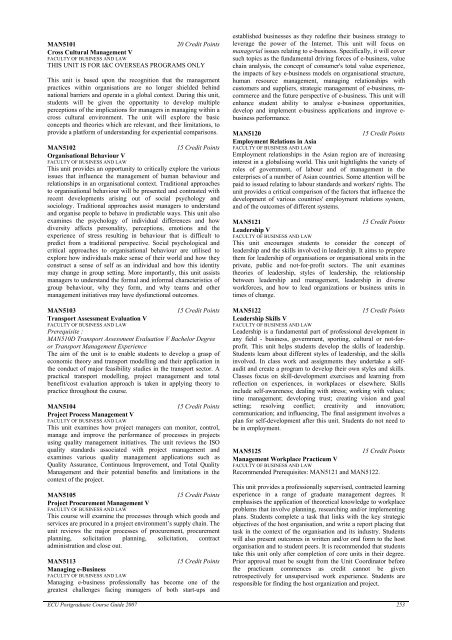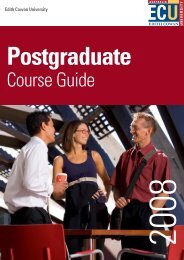Course Guide - Edith Cowan University
Course Guide - Edith Cowan University
Course Guide - Edith Cowan University
Create successful ePaper yourself
Turn your PDF publications into a flip-book with our unique Google optimized e-Paper software.
MAN5101<br />
20 Credit Points<br />
Cross Cultural Management V<br />
FACULTY OF BUSINESS AND LAW<br />
THIS UNIT IS FOR I&C OVERSEAS PROGRAMS ONLY<br />
This unit is based upon the recognition that the management<br />
practices within organisations are no longer shielded behind<br />
national barriers and operate in a global context. During this unit,<br />
students will be given the opportunity to develop multiple<br />
perceptions of the implications for managers in managing within a<br />
cross cultural environment. The unit will explore the basic<br />
concepts and theories which are relevant, and their limitations, to<br />
provide a platform of understanding for experiential comparisons.<br />
MAN5102<br />
15 Credit Points<br />
Organisational Behaviour V<br />
FACULTY OF BUSINESS AND LAW<br />
This unit provides an opportunity to critically explore the various<br />
issues that influence the management of human behaviour and<br />
relationships in an organisational context. Traditional approaches<br />
to organisational behaviour will be presented and contrasted with<br />
recent developments arising out of social psychology and<br />
sociology. Traditional approaches assist managers to understand<br />
and organise people to behave in predictable ways. This unit also<br />
examines the psychology of individual differences and how<br />
diversity affects personality, perceptions, emotions and the<br />
experience of stress resulting in behaviour that is difficult to<br />
predict from a traditional perspective. Social psychological and<br />
critical approaches to organisational behaviour are utilised to<br />
explore how individuals make sense of their world and how they<br />
construct a sense of self as an individual and how this identity<br />
may change in group setting. More importantly, this unit assists<br />
managers to understand the formal and informal characteristics of<br />
group behaviour, why they form, and why teams and other<br />
management initiatives may have dysfunctional outcomes.<br />
MAN5103<br />
15 Credit Points<br />
Transport Assessment Evaluation V<br />
FACULTY OF BUSINESS AND LAW<br />
Prerequisite :<br />
MAN510D Transport Assessment Evaluation V Bachelor Degree<br />
or Transport Management Experience<br />
The aim of the unit is to enable students to develop a grasp of<br />
economic theory and transport modelling and their application in<br />
the conduct of major feasibility studies in the transport sector. A<br />
practical transport modelling, project management and total<br />
benefit/cost evaluation approach is taken in applying theory to<br />
practice throughout the course.<br />
MAN5104<br />
15 Credit Points<br />
Project Process Management V<br />
FACULTY OF BUSINESS AND LAW<br />
This unit examines how project managers can monitor, control,<br />
manage and improve the performance of processes in projects<br />
using quality management initiatives. The unit reviews the ISO<br />
quality standards associated with project management and<br />
examines various quality management applications such as<br />
Quality Assurance, Continuous Improvement, and Total Quality<br />
Management and their potential benefits and limitations in the<br />
context of the project.<br />
MAN5105<br />
15 Credit Points<br />
Project Procurement Management V<br />
FACULTY OF BUSINESS AND LAW<br />
This course will examine the processes through which goods and<br />
services are procured in a project environment’s supply chain. The<br />
unit reviews the major processes of procurement, procurement<br />
planning, solicitation planning, solicitation, contract<br />
administration and close out.<br />
MAN5113<br />
15 Credit Points<br />
Managing e-Business<br />
FACULTY OF BUSINESS AND LAW<br />
Managing e-business professionally has become one of the<br />
greatest challenges facing managers of both start-ups and<br />
established businesses as they redefine their business strategy to<br />
leverage the power of the Internet. This unit will focus on<br />
managerial issues relating to e-business. Specifically, it will cover<br />
such topics as the fundamental driving forces of e-business, value<br />
chain analysis, the concept of consumer's total value experience,<br />
the impacts of key e-business models on organisational structure,<br />
human resource management, managing relationships with<br />
customers and suppliers, strategic management of e-business, m-<br />
commerce and the future perspective of e-business. This unit will<br />
enhance student ability to analyse e-business opportunities,<br />
develop and implement e-business applications and improve e-<br />
business performance.<br />
MAN5120<br />
15 Credit Points<br />
Employment Relations in Asia<br />
FACULTY OF BUSINESS AND LAW<br />
Employment relationships in the Asian region are of increasing<br />
interest in a globalising world. This unit hightlights the variety of<br />
roles of government, of labour and of management in the<br />
enterprises of a number of Asian countries. Some attention will be<br />
paid to issued relating to labour standards and workers' rights. The<br />
unit provides a critical comparison of the factors that influence the<br />
development of various countries' employment relations system,<br />
and of the outcomes of different systems.<br />
MAN5121<br />
15 Credit Points<br />
Leadership V<br />
FACULTY OF BUSINESS AND LAW<br />
This unit encourages students to consider the concept of<br />
leadership and the skills involved in leadership. It aims to prepare<br />
them for leadership of organisations or organisational units in the<br />
private, public and not-for-profit sectors. The unit examines<br />
theories of leadership, styles of leadership, the relationship<br />
between leadership and management, leadership in diverse<br />
workforces, and how to lead organizations or business units in<br />
times of change.<br />
MAN5122<br />
15 Credit Points<br />
Leadership Skills V<br />
FACULTY OF BUSINESS AND LAW<br />
Leadership is a fundamental part of professional development in<br />
any field - business, government, sporting, cultural or not-forprofit.<br />
This unit helps students develop the skills of leadership.<br />
Students learn about different styles of leadership, and the skills<br />
involved. In class work and assignments they undertake a selfaudit<br />
and create a program to develop their own styles and skills.<br />
Classes focus on skill-development exercises and learning from<br />
reflection on experiences, in workplaces or elsewhere. Skills<br />
include self-awareness; dealing with stress; working with values;<br />
time management; developing trust; creating vision and goal<br />
setting; resolving conflict; creativity and innovation;<br />
communication; and influencing, The final assignment involves a<br />
plan for self-development after this unit. Students do not need to<br />
be in employment.<br />
MAN5125<br />
15 Credit Points<br />
Management Workplace Practicum V<br />
FACULTY OF BUSINESS AND LAW<br />
Recommended Prerequisites: MAN5121 and MAN5122.<br />
This unit provides a professionally supervised, contracted learning<br />
experience in a range of graduate management degrees. It<br />
emphasises the application of theoretical knowledge to workplace<br />
problems that involve planning, researching and/or implementing<br />
plans. Students complete a task that links with the key strategic<br />
objectives of the host organisation, and write a report placing that<br />
task in the context of the organisation and its industry. Students<br />
will also present outcomes in written and/or oral form to the host<br />
organisation and to student peers. It is recommended that students<br />
take this unit only after completion of core units in their degree.<br />
Prior approval must be sought from the Unit Coordinator before<br />
the practicum commences as credit cannot be given<br />
retrospectively for unsupervised work experience. Students are<br />
responsible for finding the host organization and project.<br />
ECU Postgraduate <strong>Course</strong> <strong>Guide</strong> 2007 253



